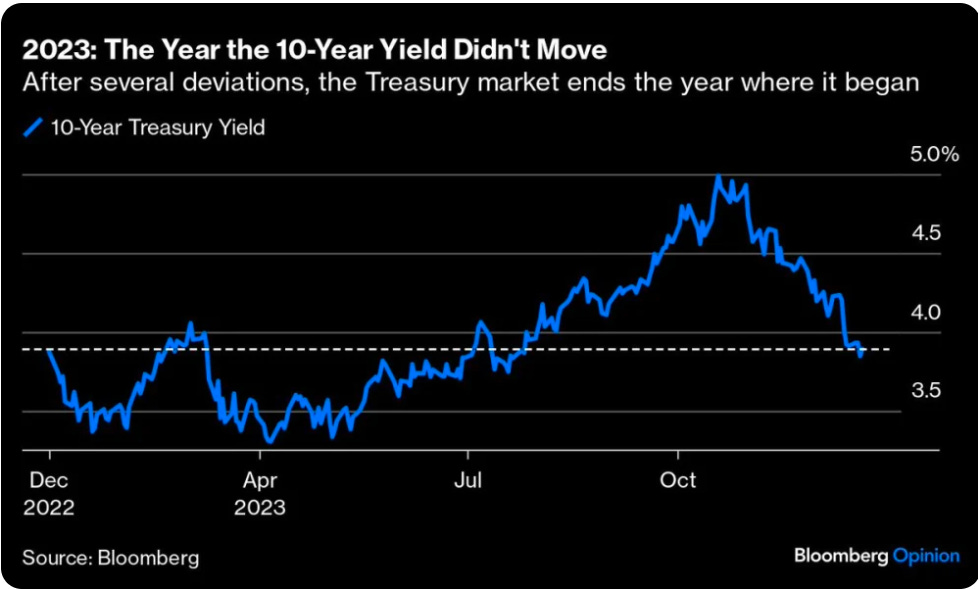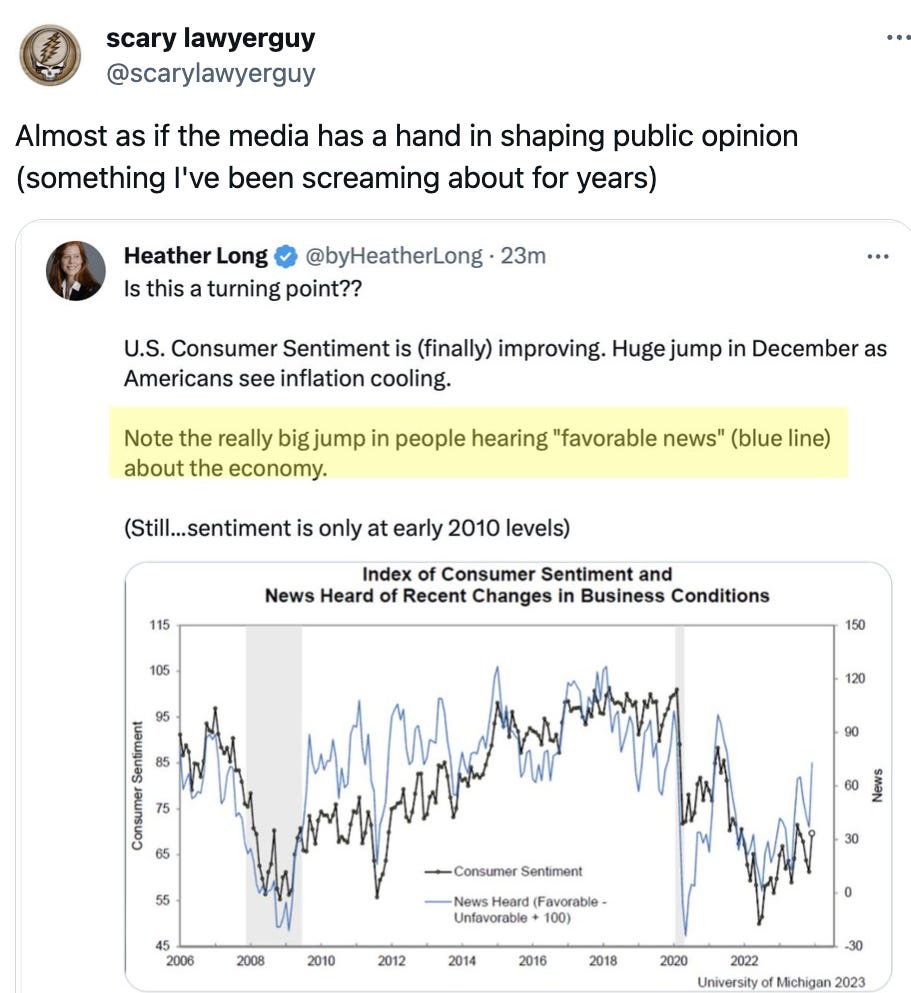BRIEFLY NOTED: For 2023-12-26 Tu
Starting to pack a SubStack-exit parachute; are the Magnificent Seven productivity, monopoly, or bubble?; Karl Smith on Team Rate Cuts Now!; “Economist” writers need to read their own magazine much...
Starting to pack a SubStack-exit parachute; are the Magnificent Seven productivity, monopoly, or bubble?; Karl Smith on Team Rate Cuts Now!; “Economist” writers need to read their own magazine much more carefully; 2023 bond-market round-trip; news coverage & pessimism about the economy; Alan Rickman was an acting god; very briefly noted; & New Year 2024 paid-subscription sale, Cyrus the Persian Anointed of the LORD, appreciating Ernst Gellner, & BRIEFLY NOTED: For 2023-12-23 Sa…
Public Reason: As Ken White says, The SubStack Nazi problem is not that they do not police (save for porn, & c.), who they let use their service to construct their own Walled Garden or misinformation-broadcast newsletter. The problem is that they see money to be made in boosting neofascists.
That is, most important, defecating in the information stream. That is, second most important, a downstream problem for me when the Nazi Bar elements begin leaking over to my readership through SubStack’s recommendation engines.
So it is time to think about how—if things deteriorate—to set myself up to leave the platform for another:
Russell Nohelty: ‘I know a lot of people are considering leaving Substack because of the current troubles…. Beehiiv and Ghost and all sorts of other solutions… are very expensive…. Were I to leave… WordPress from a host like Bluehost, Siteground, Godaddy, etc…. Elementor and Themify… the Newsletter plugin… or Sendy (wordpress.org/plugins/sendy-widget) to send emails…. Rmail set up for your domain… for about $5/mo from Google. For your paywall… Memberful…
Economics: Is the extraordinarily rapid runup in the Magnificent Seven this year a monopoly fact, a productivity fact, or a positive feedback bubble fact? What the stock market performance in 2023 tells us about the future really, really hinges on which of those three factor is the one most in play. And I have not seen a good analysis. It provides me with enough information to make any kind of reasonable judgment:
Katie Martin: Year in a World: Magnificent Seven: ‘For a short time at the start of 2023, stock markets behaved as recession-obsessed investors expected: badly. But a drab start quickly gave way to a rally dominated by a clutch of big tech names stitched loosely together through the hot theme of artificial intelligence: Apple, Microsoft, Alphabet, Amazon, Tesla, Meta and Nvidia. By June, their Magnificent Seven nickname was really starting to stick. Some element of top-heaviness is a reasonably common feature in US equities, but the Magnificent Seven (or Mag7 for short) have taken that to new extremes.… The Mag7 have gained more than 100 per cent this year and account for a massive 30 per cent or so of the index. Without them, the S&P 500 is up 11 per cent; with them, the performance is doubled…. Investors say… inflows are coming from conservative investors seeking companies that can weather a downturn, stockpickers convinced of the AI revolution, short-termists chasing high-flying stocks and index trackers following a broad index. <https://www.ft.com/content/ba909fe4-955c-4943-a179-273dd4908bcd>
Economics: The very sharp Karl Smith sees low average hours as a potential sign of weakness—any slackening of demand will see people get fired, which is likely to start a vicious circle as the fired and those who fear that they might be fired cut back on their consumption:
Karl Smith: Fed Rate Cuts Must Come Sooner Rather Than Later <https://www.bloomberg.com/opinion/articles/2023-12-22/why-the-federal-reserve-must-cut-interest-rates-sooner-rather-than-later>: ‘The labor market is rapidly weakening in ways that aren’t well appreciated, raising the risk of a recession if the central bank waits too long to ease monetary policy…. [Thus] Powell should be more worried about tipping the economy into a recession by not lowering rates than he might be with squeezing out the so-called “last mile” of inflation by keeping borrowing costs higher for longer than needed…
Journamalism: Do the writers of the London Economist read their own rag? It seems that they probably do not.
I read today that: “a paper finding that <economist.com/finance-and-economics/202…> after taxes and transfers American incomes are barely less equal than in the 1960s was accepted for publication…. Piketty’s faction is on the defensive, accusing its critics of ‘inequality denial’…”
But if the Economist writers had read their own magazine, they would have been given substantial pause, because they would have read Wojciech Kopczuk’s observation: “The remarkable thing is that almost all of their modifications push in the same direction—that’s something you wouldn’t expect a priori.” It really is not. Studies that put their thumb on the scale to that degree are highly untrustworthy. That should have given the bosses who wrote the piece I quote below a lot of pause.
And I think they should have just put their piece in the circular file once they had reflected enough to notice this: Elon Musk’s wealth today is 2.5 million times median family income while Daniel Ludwig’s—his predecessor back in 1982—wealth was only 85 thousand times median income tells me that top income and wealth inequality has really exploded in a way totally inconsistent with Auten and Splinter’s claims. It is Auten and Splinter—not Piketty and company—who seem to me to be very much on the defensive, in the sense of having a very hard time answering simple questions about the implications of their numbers:
Economist: Economists had a dreadful 2023: ‘Economists who deal in sober empirical work have also had their conclusions challenged. Consider… inequality…. Thomas Piketty and his co-authors… found a rising gap between rich and poor. But in November a paper finding that <economist.com/finance-and-economics/202… after taxes and transfers American incomes are barely less equal than in the 1960s was accepted for publication by one of the discipline’s top journals. Now Mr Piketty’s faction is on the defensive, accusing its critics of “inequality denial”… <economist.com/leaders/2023/12/20/econom…>
ONE IMAGE: Bond Market Round Trip
ANOTHER IMAGE:
ONE VIDEO: Alan Rickman:
Very Briefly Noted:
Neofascism: G.T. Conway: ‘The plan for January 6th was to have Alex Jones march their most crazed supporters to the Capitol so that there would be enough reason to evacuate Pence, and have Grassley (or whomever) move forward with the fake electors plan. But all of that was foiled when Pence refused to get in the car.It was one thing for his VP to refuse to go along with their plan, but now he wouldn't even just evacuate—which triggered Trump to tell Meadows, 'fine, then maybe he deserves to be hanged'… <https://www.threads.net/@gtconway3dg/post/C1UY7v_udrL>
Economics: What the Solow Model Can Teach Us About China: ‘Because of depreciation and diminishing returns, a country simply can’t build its way to infinitely high standards of living. If you just keep trying to build more and more, at some point depreciation overwhelms you. and you just can’t build any more!… The Solow model gives a simple explanation for how China was able to build this much, this fast: It had a very high rate of savings and investment, far higher even than other Asian countries…. But the Solow model says that this type of growth has a limit…
Arindrajit Dube: ‘Why is Immaculate Disinflation seen as win for Team Transitory? Here need to look conditional (not just unconditional) predictions. Big disinflation with no unemp hike is signature of supply healing. And supply healing was the key point of TT…. Rate hikes could have led to:1) reduction in inflation through inc in unemp lowering demand (main channel proposed)2) increased unemp and little change in inflation (if supply stayed snarled).Thankfully 2 didn't happen. Importantly, neither did 1. This is not to say the higher rates had no effect on demand. However, the main postulated mechanism [by Team Persistent for inflation reduction] is through the labor market, leading to reduced incomes and demand. That certainly didn't happen. The signature of disinflation points to big supply easing. And that was TT point… <https://twitter.com/arindube/status/1738326662515704289>
Ivan Werning: ‘You can argue details, but saying this inflation was the 70s, demand from stimulus or slows or timid monetary response, or some other fiscal immaculate inflation is bananas. Yet focus on supply vs demand is a more political than obviously policy relevant. At least standard macro theory says we should respond similarly to both. This is why I think it’s important to think about Cost Push. Uneven sectoral shocks give you cost push in aggregate <https://kansascityfed.org/documents/8322/JH_Guerrieri.pdf>. And it was not hot labor market… <https://twitter.com/IvanWerning/status/1738707498578649212>
Matthew Connatser: Intel's CEO says Moore's Law is slowing to a three-year cadence, but it's not dead yet: ‘Gelsinger… began by saying… “we've been declaring the death of Moore's Law for about three to four decades.” However, he eventually followed this up with “we're no longer in the golden era of Moore's Law, it's much, much harder now, so we're probably doubling effectively closer to every three years now, so we've definitely seen a slowing”… <https://www.tomshardware.com/tech-industry/semiconductors/intels-ceo-says-moores-law-is-slowing-to-a-three-year-cadence-but-its-not-dead-yet>
Economic History: Claudia Goldin & Michael Klein: EconoFact Chats: Careers, Families, and Women’s Journey towards Economic Equity: ‘There are three areas in which one can make change…. The price of care…. The price of flexibility…. Gender norms… <https://econofact.org/wp-content/uploads/2023/01/EFChats-Transcropt-Goldin-Careers-Families-and-Womens-Journey-Towards-Economic-Equity.pdf>
Ernst Gellner: Muslim Society: ‘I like to imagine what would have happened had the Arabs won at Poitiers and gone on to conquer and Islamise Europe. No doubt we should all be admiring Ibn Weber's "The Kharejite Ethic and the Spirit of Capitalism", which would conclusively demonstrate how the modern rational spirit and its expression in business and bureaucratic organisation could only have arisen in consequence of the sixteenth-century neo-Kharejite puritanism in northern Europe. In particular, the work would demonstrate how modern economic and organisational rationality could never have arisen had Europe stayed Christian, given the inveterate proclivity of that faith to a baroque, manipulative, patronage-ridden, quasianimistic and disorderly vision of the world. A faith so given to seeing the cosmic order as bribable by pious works and donations could never have taught its adherents to rely on faith alone and to produce and accumulate in an orderly, systematic, and unwavering manner. Would they not always have blown their profits in purchasing tickets to eternal bliss, rather than going on to accumulate more and more?… <https://archive.org/details/muslimsociety0000gell>
David Aaronovitch: E.P. Thompson & Anti-Stalinism: ‘Thompson was… a rescuer—someone who wanted to stay in touch, to retrieve things of value from the past…. Instead of seeing… passive victims of progress or else its doomed opponents… Thompson wanted to restore to them their energy, agency and independence…. This project is as much a product of his period as a communist as it ever was of his leaving the communist party. Perhaps even more, awkward though this is to acknowledge.
And he was a rescuer too of his own emotional past. In Leszek Kolakowski’s Poland the communists did the spying. In EP Thompson’s post-war Britain the communists were the spied upon…
Michela Giorcelli: Creating the “American Way” of Business: ‘The Second World War[‘s]… effect on U.S. ‘‘managerial technology’’ innovations has been largely ignored…. ‘‘Managerial technology’’ played a key role in shaping U.S. WWII production…. The large-scale diffusion of innovative management practices to US firms involved in war production acted as a technology that put them on a higher growth path for decades… made U.S. managerial practices internationally distinctive and helped create the so-called “American Way” of business… exported to war-torn European and Japanese economies in the war aftermath… <https://www.nber.org/papers/w31980>
Global Warming: Steven T. Dennis: ‘The Kia EV9 and the Rivian R1S seem to be the two big three-row EVs duking it out for suburban family EV supremacy next year. GM still can't seem to build Ultium-models at scale and the Escalade is going to be nosebleed priced, Ford Explorer EV a ways off, Toyota doesn't even have a plug-in hybrid Sienna/Highlander yet. Seeing a lot of Rivians last few months on my DC commute. The Kia reviews coming out are glowing… <https://www.threads.net/@steventdennis/post/C1UdabjOBej>













Uh ... four of the namesake Magnificent Seven were killed. And the summing-up line of the movie was "The Old Man was right. Only the farmers won. We lost. We'll always lose." Just saying.
What happens to the annual subscription if you pull the ripcord and decamp SubStack?